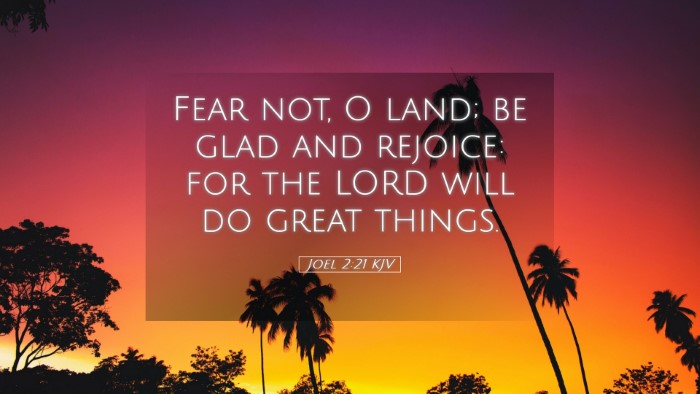Commentary on Joel 2:21
Among the prophetic books of the Old Testament, the Book of Joel stands out with its vivid language and strong themes of judgment and restoration. In Joel 2:21, we find a call to the people of God, urging them to recognize the mercy and power of God amidst the calamity that surrounds them.
Text of Joel 2:21
"Fear not, O land; be glad and rejoice: for the LORD will do great things."
Exegesis of Joel 2:21
The verse opens with an imperative: "Fear not." This phrase serves as both reassurance and a call to trust in God’s provision. The context of fear relates to the devastation that the land has experienced. Matthew Henry notes that the promise of restoration from locusts and drought calls the people to replace their fear with joy.
Albert Barnes comments on the phrase “O land,” indicating that the land itself, not just the inhabitants, is the subject of God’s renewing work. The land has suffered due to the sins of its people, yet God’s grace extends to creation itself—a profound theological reflection demonstrating God’s concern for all aspects of His creation.
Theological Implications
This verse highlights key theological themes:
- The Sovereignty of God: God’s control over the natural world and history is emphasized. He acts to restore and bless, reminding us of His supreme authority over all things.
- Hope and Restoration: The directive to "be glad and rejoice" signifies that despair is not the final word. The assurance that "the LORD will do great things" invites anticipation and hope among believers.
- The Role of the Community: As Albert Barnes indicates, the collective joy of the land requires a communal experience of God's restoration; this reflects the call for unity among God’s people in acknowledging His works.
Matthew Henry's Insights
Henry emphasizes the need for God’s people to recognize His mercy. He suggests that regardless of the preceding judgments, God's promise of great things births an expectation of joy and restoration. Furthermore, the call to rejoice serves as a declaration of faith in God’s ability to renew even the most desolate circumstances.
Albert Barnes's Commentary
Barnes elaborates on the dual nature of God’s character as both a God of justice and a God of mercy. His remarks on “be glad and rejoice” prompt reflection on the faithful response of a community that has faced adversity, encouraging believers not to wallow in despair but to lift their eyes toward divine promise.
Adam Clarke's Perspective
Adam Clarke, in his commentary, notes that this call to rejoice is not merely emotional but is tied to action. The practical obedience of the people to follow God’s commands is crucial for experiencing His restoration fully. Clarke asserts that joy in the Lord should move believers toward righteous living as a demonstration of gratitude for His goodness.
Application for Today's Believers
Joel 2:21 resonates strongly with modern Christian experiences. The challenges faced by churches and communities today mirror the desolation expressed in the text. Pastors and leaders are encouraged to share this message of hope and restoration, reminding their congregations that God is actively working to bring about His purpose amidst trials.
The call to “fear not” challenges believers to confront their anxieties with faith. There often exists a tension between our circumstances and our understanding of God's promises. By reflecting on the assurance provided in this verse, congregations can be equipped to respond with faith and rejoicing, recognizing that God's greatness prevails over present difficulties.
Conclusion
In summary, Joel 2:21 is a profound statement of faith and hope, rooted in the character of God as a restorer of brokenness. Through the insights of Matthew Henry, Albert Barnes, and Adam Clarke, we see a multifaceted understanding of this verse that speaks loudly to the themes of divine sovereignty, communal faith, and the active restoration that God promises. As believers engage with this scripture, they are reminded to anticipate God's work in their lives and the world around them with joyful expectation.


